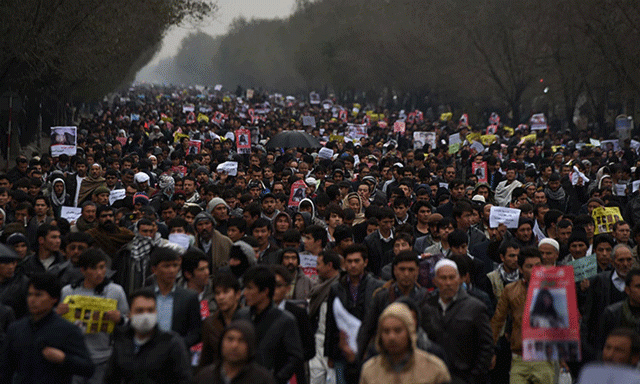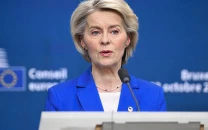Hundreds of Afghan Shias protest at IS killings
'This is a dangerous trend and we want the government to protect us'

A file photo of Afghan protesters during a protest demonstration, over the killing of seven Shia Hazaras, in Kabul. PHOTO: AFP
Chanting "Death to the enemies of Afghanistan!" and "Death to Daesh!", the Arabic acronym for IS, the protesters in the city of Herat marched on the governor's office, carrying pictures of Shias killed in recent attacks.
"Daesh attacks on our mosques are increasing everyday. They want to create a rift between Shias and Sunnis," Qurban Ali, a 40-year-old demonstrator, told AFP. "This is a dangerous trend and we want the government to protect us."
At least 80 dead, 231 hurt as Hazara rally attacked in Kabul
The rise of IS has raised the spectre of sectarian discord in Afghanistan, something that the Sunni-majority country has largely been spared despite decades of war. Until a few months ago IS was largely confined to the eastern province of Nangarhar bordering Pakistan, where it is notorious for brutality including beheadings despite a US-backed offensive against the group.
But the government this week said the group was steadily expanding into other provinces. "Our initial information shows Daesh is behind the recent attacks in Herat. They are expanding and are always looking for new geographical areas," Najeebullah Mani, head of counter-terrorism at the interior ministry, told reporters in Herat.
"They are present in at least 11 (of Afghanistan's 34 provinces). Their main goal is to create sectarian divisions between Shias and Sunnis." Herat, which borders Shia-dominated Iran, has recently witnessed a surge in attacks on the minority group's mosques.
A prayer leader was killed and five others wounded in one such attack on Sunday. The group did not officially claim responsibility for the assault. "We will not allow Daesh to make Afghanistan another Syria," said 30-year-old Jawad, another protester. "The government must come up with a plan to protect Shiaes."
Thousands attend funerals of beheaded Afghan Shia Hazaras
Last year Afghanistan witnessed a wave of attacks on Shias claimed by IS, which considers Shia Muslims apostates. At least 14 Shias were killed in October in a powerful blast at a mosque in the northern city of Mazar-e-Sharif, hours after gunmen targeted Shia worshippers in a shrine in Kabul and killed 18 people.
In July the IS militants targeted members of Kabul's Shia community in a suicide bombing that killed more than 80 people and wounded 130.












1724319076-0/Untitled-design-(5)1724319076-0-208x130.webp)






COMMENTS
Comments are moderated and generally will be posted if they are on-topic and not abusive.
For more information, please see our Comments FAQ